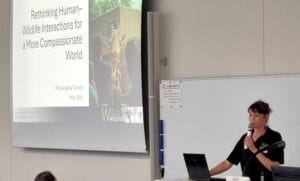Wild Welfare recently visited Japan to drive forward a plan to improve the lives of countless captive wild animals across the country. The visit included a programme of high-level engagements with national NGOs, government representatives, and prominent academics. The core focus of the engagement was to promote a compassionate and scientifically informed approach to human-wildlife interactions, strengthening protections for kept exotic species in Japan’s many zoos, aquariums and exotic animal cafes.
In late September, Wild Welfare’s Executive Director, Simon Marsh, and Animal Welfare Consultant, Georgina Groves, travelled to Tokyo to address a public symposium at the University of Veterinary and Life Sciences in collaboration with the Japanese Coalition for Animal Welfare (JCAW). The Wildlife Husbandry Management and Human-Wildlife Contact event explored the current status and challenges of keeping wild animals in captivity.
 During Simon’s presentation, he highlighted the trend towards increased public and tourism industry awareness of animal welfare issues both internationally and domestically in Japan. He noted that growing public awareness of what constitutes good animal care and welfare is a key component of reforming unethical behaviors and common practices. Simon referenced key factors that can result in poor animal care, drawing upon commonalities identified in published research, building on his evidence-based case for change. Georgina Groves followed up by discussing the negative welfare impacts of human-animal interactions, such as those commonly seen at exotic animal cafes across Japan. Georgina explained how ‘novel’ and ‘intimate’ human-animal interactions negatively normalise the objectification of wild animals, making them appear nothing more than props for human entertainment. She expressed how, aside from the poor welfare, this sort of interaction was ineffective for achieving educational or conservation goals and contributed to further disconnecting the public from positive wildlife engagement.
During Simon’s presentation, he highlighted the trend towards increased public and tourism industry awareness of animal welfare issues both internationally and domestically in Japan. He noted that growing public awareness of what constitutes good animal care and welfare is a key component of reforming unethical behaviors and common practices. Simon referenced key factors that can result in poor animal care, drawing upon commonalities identified in published research, building on his evidence-based case for change. Georgina Groves followed up by discussing the negative welfare impacts of human-animal interactions, such as those commonly seen at exotic animal cafes across Japan. Georgina explained how ‘novel’ and ‘intimate’ human-animal interactions negatively normalise the objectification of wild animals, making them appear nothing more than props for human entertainment. She expressed how, aside from the poor welfare, this sort of interaction was ineffective for achieving educational or conservation goals and contributed to further disconnecting the public from positive wildlife engagement.
In total, over 50 individuals attended the symposium in-person and online; including representatives from other NGOs, local authorities, zoos, animal-related schools, national press, and the general public. Also in attendance was the Chair of the Government’s Animal Welfare Committee and a prominent Kokkai from the Ministry of the Environment. Such an audience positively indicated how collaborative advocacy efforts are starting to gain real momentum within the country.
Following the symposium, key stakeholders held a followup meeting to solidify partnerships and coordinate strategies for driving forward actions to bring about robust welfare reforms. Wild Welfare representatives met with partner organisation, the Japan Coalition for Animal Welfare (JCAW), to discuss coordinating advocacy efforts, with discussions centring on leveraging momentum in cooperation with engaged political figures within the country. Focus was placed on discussing how a robust national licensing system should ideally be introduced to significantly improve standards for zoos and aquariums across the country. “The integration of strong welfare considerations across conservation, research, and education frameworks is paramount for positive progress within this area” Georgina explained.
 Further discussions continued in collaboration with JCAW, JAZA (Japanese Association of Zoos and Aquariums), and WWF Japan to explore areas of collaboration to address urgent issues such as zoonotic disease risks in animal cafés and the exotic pet trade, as well as animal welfare concerns. WWF Japan shared valuable insights from their recent risk assessment on animal cafés, reinforcing the need for policy to be guided by both animal welfare and public health considerations. This supported the findings from a collaborative research paper from Wild Welfare, Nippon Life Sciences University and Nottingham Trent University, on animal cafes in Japan, which is due to be published soon. Wild Welfare reaffirmed its commitment to providing technical expertise and capacity-building resources to support partners in driving these essential reforms into fruition.
Further discussions continued in collaboration with JCAW, JAZA (Japanese Association of Zoos and Aquariums), and WWF Japan to explore areas of collaboration to address urgent issues such as zoonotic disease risks in animal cafés and the exotic pet trade, as well as animal welfare concerns. WWF Japan shared valuable insights from their recent risk assessment on animal cafés, reinforcing the need for policy to be guided by both animal welfare and public health considerations. This supported the findings from a collaborative research paper from Wild Welfare, Nippon Life Sciences University and Nottingham Trent University, on animal cafes in Japan, which is due to be published soon. Wild Welfare reaffirmed its commitment to providing technical expertise and capacity-building resources to support partners in driving these essential reforms into fruition.
Wild Welfare Director, Simon Marsh explained that, “As part of our ongoing research and advocacy against the use of wild animals for purely entertainment purposes, we are committed to seeing an end to the exploitation of wildlife in animal cafes across Japan ”. The charity is now calling for much-needed regulation to be implemented to protect animals housed in these establishments. “It has become clear that thousands of exotic species are being kept in significantly poor and inadequate conditions, causing mass unnecessary animal suffering” Simon concluded.
Overall, the visit was highly productive, reinforcing Wild Welfare’s dedication to supporting Japan’s growing animal welfare movement. Cooperation between NGOs, government officials, and industry bodies, is laying out a clear roadmap towards stronger, more compassionate protection for all captive wild animals across Japan.
ENDS
Wild Welfare is devoted to improving the welfare of captive animals across the world. You can support our efforts by sharing this article, signing up to our newsletter, following our social media accounts (Facebook and Instagram), or by making an online donation. Every small contribution can help us to develop our vital accessible animal resources. Thank you.
Notes to Editors
For more information or interview requests please contact Wild Welfare on communications@wildwelfare.org
Wild Welfare is a global organisation committed to improving animal welfare for captive wild animals. By uniting the world’s leading zoos, zoo associations and animal welfare organisations, we build trusting partnerships that help provide long-term solutions to critical wild animal welfare issues.
Our vision is to end the suffering of captive wild animals around the world and ensure full and sustainable protection is given to all animals in human care. Find out more at wildwelfare.org. Registered charity in England (no.1165941).









Discussion about this post